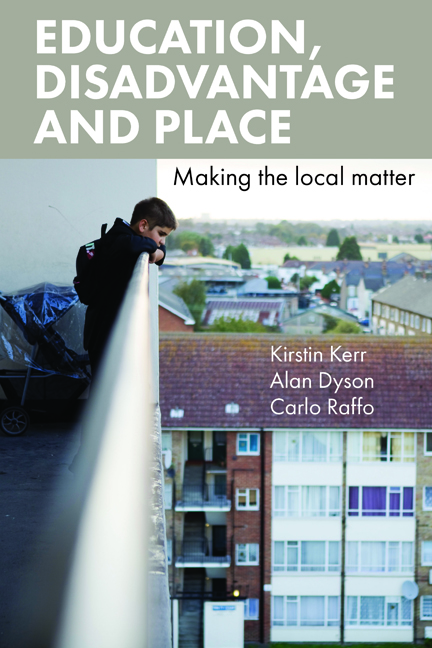Book contents
- Frontmatter
- Contents
- List of tables and figures
- Notes on authors
- Acknowledgements
- one Introduction
- two Why place matters in education
- three Local education systems as products of place: a case study
- four Learning from the past
- five Learning from the present
- six A rationale for a new generation of area-based initiatives
- seven Developing understandings of place as a basis for intervention
- eight Evaluation and monitoring
- nine Governance and accountability
- ten Children and places in hard times: some concluding thoughts
- References
- Index
seven - Developing understandings of place as a basis for intervention
Published online by Cambridge University Press: 25 February 2022
- Frontmatter
- Contents
- List of tables and figures
- Notes on authors
- Acknowledgements
- one Introduction
- two Why place matters in education
- three Local education systems as products of place: a case study
- four Learning from the past
- five Learning from the present
- six A rationale for a new generation of area-based initiatives
- seven Developing understandings of place as a basis for intervention
- eight Evaluation and monitoring
- nine Governance and accountability
- ten Children and places in hard times: some concluding thoughts
- References
- Index
Summary
We have proposed that the future of area-based initiatives (ABIs) – and education-focused ABIs in particular – lies in reconceptualising them as locally developed interventions that engage with an ecological understanding of place. This means that they need to be able to engage with the complex interactions between the different factors that help to shape – but do not fully determine – people's outcomes. With a particular concern for poor educational outcomes, in previous chapters we have explored how different factors can originate and/or operate at different spatial scales – from the micro-level context of the individual and family, to macro-level social and economic policies – and may be experienced differently by different people. We have also considered that in different places, different factors may be present, or may be more or less influential, or may interact differently. Moreover, we have seen that people and places exist in a dynamic relationship; places can shape people's lives, and how people live can, in turn, shape the places where they live. A new generation of ABIs will somehow need to be able to understand and engage with these complex dynamics. Our purpose in this chapter is to explore how they might go about doing so.
We approach this task wearing both of our professional ‘hats’. As we explained in the introduction to this book, we are university-based academics, a position that allows us to bring a range of disciplinary perspectives to bear on the task at hand. Therefore, in the first part of this chapter, we outline the sorts of issues within local ecologies of people and place that a multidisciplinary approach can help to illuminate. However, our thinking – and, indeed, our view that ABIs have a future – is grounded just as strongly in our empirical experience. In this respect, much of our work has involved supporting local stakeholders – typically, groups of professionals, including head teachers, local authority (LA) officers and the leaders of third sector organisations – who are in a position to take direct action to change local services, and who, as in Weston and Heybury, have been trying to develop new responses to seemingly intractable problems. We are, therefore, also well aware of the considerable operational challenges that local stakeholders will face in trying to understand the situations in which they want to intervene, and in subsequently taking action.
- Type
- Chapter
- Information
- Education, Disadvantage and PlaceMaking the Local Matter, pp. 131 - 146Publisher: Bristol University PressPrint publication year: 2014



